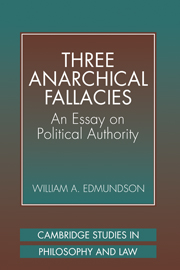Book contents
- Frontmatter
- Contents
- Acknowledgments
- Introduction
- Part One The Fallacious Argument from the Failure of Political Obligation
- Part Two The “Law Is Coercive” Fallacy
- 4 The Concept of Coercion
- 5 Political Theory without Coercion
- 6 Coercion Redivivus
- Part Three The Inner Sphere of Privacy Fallacy
- Conclusion: The State for What?
- Index
5 - Political Theory without Coercion
from Part Two - The “Law Is Coercive” Fallacy
Published online by Cambridge University Press: 19 March 2010
- Frontmatter
- Contents
- Acknowledgments
- Introduction
- Part One The Fallacious Argument from the Failure of Political Obligation
- Part Two The “Law Is Coercive” Fallacy
- 4 The Concept of Coercion
- 5 Political Theory without Coercion
- 6 Coercion Redivivus
- Part Three The Inner Sphere of Privacy Fallacy
- Conclusion: The State for What?
- Index
Summary
There are many ways to avoid Haksar's argument to the repugnant conclusion that law isn't coercive. There are, for example, different conceptions of the proper moral baseline to use in Case 6, the Robbery Statute case, just as there was disagreement about the proper moral baseline to use in Case 9, the Sea Rescue case. But the standard view, that law is coercive, is already badly embarrassed if it has to deal with the Robbery Statute case by taking a stand on what the right moral baseline is. Wertheimer asks, “How do we set B's moral baseline? … a full answer to this question would require nothing less than a complete moral and political theory.” But if that's so, then classical liberalism, “an entire political theory [that] may rest on a theory of coercion” (and an unexamined one at that), leads us right into “a theory of coercion [that] rests on a moral and political theory – in particular, on a theory which allows us to set moral baselines.”
That the state is an utterer of coercive proposals and a coercive agent is an assumption of liberal political theory which has served it by enabling it to cast an onus probandi upon those who argue for a more active state. The slogan “law is coercive” is supposed to tell us why state action stands in special need of justification while, at the same time, stating a truth as nearly “value-free” as any that social science is capable of locating.
- Type
- Chapter
- Information
- Three Anarchical FallaciesAn Essay on Political Authority, pp. 84 - 93Publisher: Cambridge University PressPrint publication year: 1998



